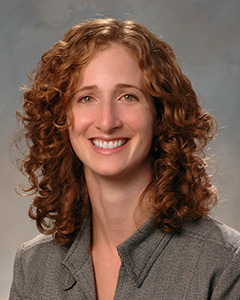
Alisa Morss Clyne
In a perfect world, blood vessels would run straight as freeways, channeling blood consistently and efficiently through the human body. Instead, they switch directions or branch off like country paths as they wend through the circulatory system, and each of those junctures impacts blood flow. In turn, blood flow impacts, among other things, the way glucose is metabolized in vascular cells, with implications for cardiovascular disease, diabetes, and other vascular pathologies. Scientists don’t know exactly why this occurs.
Alisa Morss Clyne, PhD, has been pursuing these questions for years. Now, she’ll pursue them with a $1.9 million National Institute of Health Research Project Grant (R01), the oldest mechanism for investigator-initiated grants funded by the NIH. The R01 program supports discrete, health-related research and development projects. The five-year grant was awarded for Clyne’s application, titled, The effect of laminar and disturbed flow on endothelial glucose metabolism.
Interviewed at her office last week, Clyne, an associate professor in the Mechanical Engineering and Mechanics Department (MEM), said she was “thrilled, excited, and also relieved.” The grant provides years of stable funding for her lab, Clyne said, allowing her to focus on research goals.
“This is a sustaining grant. This is what funds most biomedical engineering and biology and clinical labs,” said Clyne. “There are bigger awards that NIH offers, but they are multi-investigator centers or training grants. This is the bread and butter of NIH funding.”
Clyne works at the intersection of the biomechanics of blood flow and the biochemistry of vasculature. In her previous work on endothelial cells—a thin layer of cells that line the interior surface of blood vessels—Clyne introduced cells into simulated diabetic environments by adding high concentrations of glucose and then exposing the cells to mechanical forces they would experience in the body. She studied how the cells responded to those forces.
For the R01 project, however, she’ll reverse that process to look at how the mechanical environment, for example different blood flow regimes, impacts the way vascular cells metabolize glucose; in other words, how those cells turn glucose into energy to fuel cell function.
“The reason that’s important is that all of us get atherosclerosis plaques at locations where the blood flow is abnormal,” said Clyne. “Everywhere your blood vessels make a turn or split from one to two, there is a little area where the flow is abnormal, or disturbed. Those are the locations where we get the plaques. Do those two different kinds of flow—the straight, laminar flow or the oscillating, disturbed flow—affect the way the endothelial cells metabolize glucose?
“The changes in flow we can’t really affect. But the question is, what do those changes do and how can we moderate those downstream affects?” Clyne asked. “The disturbed flow is bad. The cells can sense changes in blood flow, and they then turn it into a biological signal, for example a change in a protein or in the gene. So, if we can’t change the flow, is there a way we can change the way the cell responds to the flow? Can we intervene so that the cell still thinks it’s in the normal flow regime?”
Clyne received her bachelor of science degree in mechanical engineering from Stanford University, and her doctorate in medical and mechanical engineering from the Harvard-MIT Division of Health Sciences and Technology at MIT. She started her career at Drexel in 2007 as the P.C. Chou Assistant Professor of Mechanical Engineering and Mechanics. She won a National Science Foundation CAREER Award in 2008.
Her research is applicable across a broad range of pathologies including cardiovascular disease, diabetes, pulmonary hypertension, and perhaps even cancer. One research outcome would be to develop drug therapies for those at risk of developing these diseases, or even as a therapeutic measurement for at-risk individuals. Cardiovascular disease is still the most prominent cause of death in this country, said Clyne. The American Heart Association is very interested in the idea of “primordial prevention,” or, troubleshooting individual lifestyles and risk factors to prevent cardiovascular disease long before onset.
“We’ve already completed a lot of the preliminary work. We have some papers we’d like to get out early to establish ourselves in this field. But now that we have the funding, we can go on to do more definitive studies. Biological assays are expensive, so when we are starting a new project we have to pick and choose very carefully what we can do. Once funded, then we have leeway to do the more exciting work,” said Clyne. “We can take what we’ve seen in the lab and move that into an animal study, for instance.”
Clyne will be recruiting several new students, including a post-doc and two to three new graduate students, to add to the lab.
Clyne described the afternoon last month when the formal announcement of the award was reported. “I took my lab out for a holiday lunch. I was saying that if this money actually comes through, we’re going to buy some new equipment and we’ll do this and we’ll do that. Then when I got back to my office, I looked at my email and there was the notice of the award.
“And my first thought was, I should have taken them somewhere nicer for lunch.”